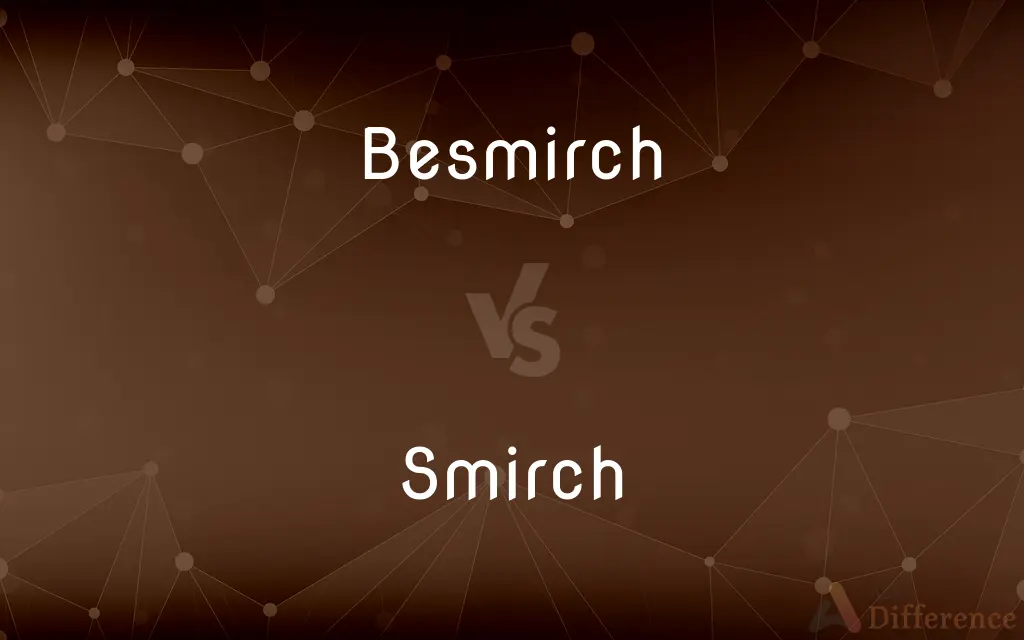Besmirch vs. Smirch — What's the Difference?
By Maham Liaqat & Urooj Arif — Updated on April 1, 2024
Besmirch involves tarnishing a reputation, while smirch can mean staining physically or metaphorically.

Difference Between Besmirch and Smirch
Table of Contents
ADVERTISEMENT
Key Differences
Besmirch and smirch are verbs related to the act of bringing harm to someone's reputation or to the physical state of an object, yet they are used in slightly different contexts and manners. Besmirch is more often used in a metaphorical sense, focusing on damaging someone's honor or reputation, whereas smirch can be used both literally, as in causing a physical stain, and metaphorically.
Besmirch is commonly associated with the act of sullying someone's good name through accusations or misdeeds, emphasizing the damage to personal integrity or honor. This term often appears in discussions of social or public figures, where reputation plays a significant role. On the other hand, smirch may refer to physical smudges or marks as well as to metaphorical stains on one's character or reputation, offering a broader range of applications.
The usage of besmirch tends to be more formal and is particularly favored in contexts that deal with moral or ethical integrity. It implies a deliberate action to tarnish someone’s reputation. Smirch, while also applicable in contexts of reputation, carries a slightly less formal tone and can refer to both physical dirtiness and metaphorical blemishes.
In literature or high-level discourse, besmirch is often chosen for its nuanced connotation of dishonoring something valuable or esteemed, such as one’s name or legacy. Smirch, by comparison, might be used in more everyday situations or to describe the act of marking or dirtying something in a less severe or consequential manner.
Besmirch implies a sense of betrayal or unjust treatment when it is used, suggesting a deeper impact on the individual’s social standing or personal feelings. Smirch, when used in the context of reputation, does not necessarily imply the same depth of impact or malicious intent, and when referring to physical stains, it is entirely neutral regarding intent.
ADVERTISEMENT
Comparison Chart
Definition
To tarnish reputation or honor
To stain or tarnish, either physically or metaphorically
Usage Context
More formal, often involving moral or ethical integrity
Less formal, can be used in a variety of contexts
Connotation
Implies deliberate action and significant impact
Can imply lighter, less intentional damage
Literal vs. Metaphorical
Primarily metaphorical
Both literal (physical) and metaphorical
Typical Subjects
Individuals’ reputation, especially public figures
Objects or individuals, in terms of physical cleanliness or reputation
Compare with Definitions
Besmirch
To stain metaphorically.
The controversy besmirched the event, leaving a shadow over the proceedings.
Smirch
To blemish or mar a surface.
The spilled coffee smirched the document irreparably.
Besmirch
To cause harm to the purity or integrity of.
Rumors can besmirch the image of an innocent person.
Smirch
To bring into disrepute or dishonor.
His actions smirched the family name.
Besmirch
To sully or soil someone’s good name.
Unfounded allegations besmirched her standing in the community.
Smirch
To tarnish morally or reputation-wise.
The accusations smirched his career as a journalist.
Besmirch
To bring disgrace or dishonor upon.
The act of plagiarism besmirched the university's reputation.
Smirch
To make dirty, stain, or tarnish.
Mud smirched the hem of her dress.
Besmirch
To tarnish someone's reputation.
The scandal besmirched the politician's career beyond repair.
Smirch
To mark with a visible feature, especially unfavorably.
Graffiti smirched the side of the new building.
Besmirch
Damage (someone's reputation)
He had besmirched the good name of his family
Smirch
Make (something) dirty; soil
The window was smirched by heat and smoke
Besmirch
To stain; sully
A reputation that was besmirched by slander.
Smirch
A dirty mark or stain.
Besmirch
To make dirty; soil.
Smirch
To soil, stain, or dirty with or as if with a smearing agent
"their tough, hostile faces, smirched by the grime and rust" (Henry Roth).
Besmirch
To make dirty.
Smirch
To dishonor; defame.
Besmirch
(transitive) To tarnish something, especially someone's reputation.
The newspaper was on a campaign to besmirch the actor.
Smirch
Something, such as a blot, smear, or stain, that smirches.
Besmirch
To smirch or soil; to discolor; to obscure. Hence: To dishonor; to sully.
Smirch
Dirt, or a stain.
Besmirch
Charge falsely or with malicious intent; attack the good name and reputation of someone;
The journalists have defamed me!
The article in the paper sullied my reputation
Smirch
(figurative) A stain on somebody's reputation.
Besmirch
Smear so as to make dirty or stained
Smirch
A chirp of radiation power from an astronomical body that has a smeared appearance on its plot in the time-frequency plane (usually associated with massive bodies orbiting supermassive black holes)
Smirch
(transitive) To dirty; to make dirty.
Smirch
To harm the reputation of; to smear or slander.
Smirch
To smear with something which stains, or makes dirty; to smutch; to begrime; to soil; to sully.
I'll . . . with a kind of umber smirch my face.
Smirch
A smutch; a dirty stain.
Smirch
A blemish made by dirt;
He had a smudge on his cheek
Smirch
An act that brings discredit to the person who does it;
He made a huge blot on his copybook
Smirch
Smear so as to make dirty or stained
Smirch
Charge falsely or with malicious intent; attack the good name and reputation of someone;
The journalists have defamed me!
The article in the paper sullied my reputation
Common Curiosities
Can besmirch and smirch be used interchangeably?
While they are similar, besmirch is more formal and often used metaphorically to refer to damaging someone's reputation, whereas smirch can also refer to physical stains.
What does it mean to smirch someone’s name?
To smirch someone’s name means to tarnish their reputation or honor, either through actions that are morally questionable or through spreading false information.
Is besmirching always intentional?
Besmirching usually implies a deliberate action to tarnish someone's reputation or honor, whereas smirching might not always be intentional, especially in its literal sense.
Does smirch apply only to physical cleanliness?
No, smirch can also refer to metaphorical stains on one’s character or reputation, not just physical cleanliness.
Can smirch have a positive connotation?
Smirch usually has a negative connotation, whether referring to physical dirtiness or metaphorical damage to reputation.
Can besmirch be undone?
Undoing the effects of besmirching can be challenging and often requires efforts to restore reputation, such as public apologies or legal actions.
Can objects be besmirched?
Besmirch is typically used in metaphorical contexts relating to reputation or honor, so it's less common to use it for objects unless metaphorically implying a tarnished reputation.
How can besmirch affect a person?
Besmirching can significantly impact a person's social standing, personal relationships, and professional opportunities by damaging their reputation.
Are there synonyms for besmirch and smirch?
Yes, synonyms include tarnish, sully, soil, stain, and discredit, though nuances in their usage and connotations may vary.
Is smirch often used in legal contexts?
Smirch can be used in legal contexts, especially when referring to actions that have led to a tarnished reputation, but it is not exclusively a legal term.
How do digital media affect the process of besmirching?
Digital media can amplify the speed and reach of besmirching, making rumors or accusations quickly spread across wide audiences, often complicating the restoration of reputation.
What does it mean to smirch someone unintentionally?
To smirch someone unintentionally means to cause harm to their reputation or to physically stain something without the intention to do so.
Can smirch be used in a playful context?
In its literal sense, smirch can be used playfully to describe situations involving physical dirtiness, such as children playing and getting dirty.
How does culture influence the perception of being besmirched?
Cultural values and norms play a significant role in how actions perceived as besmirching are judged, with some cultures placing a higher emphasis on honor and reputation.
Can companies be besmirched?
Yes, companies can be besmirched in terms of their reputation, especially related to ethical practices, product quality, or corporate governance.
Share Your Discovery

Previous Comparison
Foolish vs. Stupid
Next Comparison
Pelvis vs. HipAuthor Spotlight
Written by
Maham LiaqatCo-written by
Urooj ArifUrooj is a skilled content writer at Ask Difference, known for her exceptional ability to simplify complex topics into engaging and informative content. With a passion for research and a flair for clear, concise writing, she consistently delivers articles that resonate with our diverse audience.















































